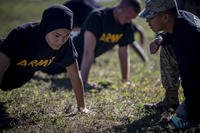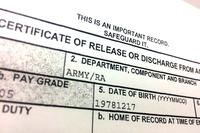Thinking of joining the Navy? Want to know what it takes and what types of jobs in the Navy are available? Get the lowdown in this fact sheet.
Navy Basics
Directory of Navy bases -- Get a feel for the Navy community with this directory of Navy bases around the country.
The latest news on the military, including the Navy -- All the latest headlines about life in the Navy and the military.
Navy equipment guide -- From the F/A-18C/D Hornet to the Deep Drone 8000, get the details on the equipment used by the Navy.
Joining the Navy
Sailors can serve as a full-time, active-duty service member or a member of the Navy Reserve.
Active duty is similar to working at a full-time civilian job. You will have your own rate and fill a specific role within your unit. Your length of service may range from 2-6 years. Active-duty members fall into two general categories: enlisted personnel and officers.
Enlisted sailors
Enlisted sailors are the backbone of the Navy, with each member having his or her own specialized training and filling a role within his or her unit. Officers are the Navy's leaders. They guide enlisted sailors and provide the know-how and expertise to get the job done. Active-duty service terms typically last 2-6 years. Deployment can last between a few weeks to six months, but the length varies depending on the size of the ship and its mission. Ships deploy every 18-24 months.
Military officer programs
There are four paths to becoming a Navy officer.
Navy ROTC -- The Navy Reserve Officers Training Corps (NROTC) allows students to enroll in elective leadership and military courses at colleges and universities. At graduation, ROTC cadets are commissioned as second lieutenants. For more details, see the ROTC section in this article.
Direct Commission -- Individuals with certain specialized skills and abilities may be eligible for a direct commission to become an officer. This typically includes fields such as law and medicine. Joining the Navy this way requires attending the Direct Commission Officer Indoctrination Course, a two-week program designed to train newly commissioned officers.
Officer Candidate School -- The Navy's Officer Candidate School provides individuals with a four-year degree the opportunity to earn their commission. This 12-week course prepares candidates physically and mentally, but candidates must pass successfully before becoming officers.
U.S. Naval Academy -- The Naval Academy accepts high school graduates and provides the education and training necessary to make them commissioned officers by the time they graduate. Those who graduate from the academy serve for at least five years in the Navy.
Serving in the Navy Reserve is similar to working a part-time job. You can live where you want, focus on your civilian career and stay close to your family. Navy reservists must serve a minimum of one weekend a month as well as two weeks a year. These requirements can include flexible drilling options in an extended mission capacity. Reserve missions range from flying F/A-18s over the weekend to caring for the medical needs of a deployed sailor's child to renovating a Navy base.
Navy Careers
Navy jobs -- Search the Navy's database of available careers for enlisted, officer and Reserve members.
Special careers in the Navy
Below is official information about specialized careers in the Navy.
Special warfare/special operations
Joining the NROTC
The Reserve Officers Training Corps (ROTC) is an elective for undergraduate and graduate students that provides leadership training. Available at many colleges and universities nationwide, it offers merit-based scholarships that can pay up to the full cost of tuition and open educational opportunities.
High school students
If you're a high school junior or senior and are interested in enrolling in Navy ROTC, you can find more information here.
College students
If you're interested in enrolling in Navy ROTC and are in college, start by talking to the Navy ROTC enrollment officer on your campus about taking the Navy ROTC basic elective course and about the incentives available, including opportunities to compete for two-, three- or four-year, merit-based scholarships.
Junior college and graduate students
If you have two years remaining in junior college or graduate school, you are still eligible to enroll in Navy ROTC. Talk to the Navy ROTC enrollment officer on your campus.
Ready to Join the Navy?
We can put you in touch with recruiters from the different military branches. Learn about the benefits of serving your country, paying for school, military career paths, and more: sign up now and hear from a recruiter near you.
















